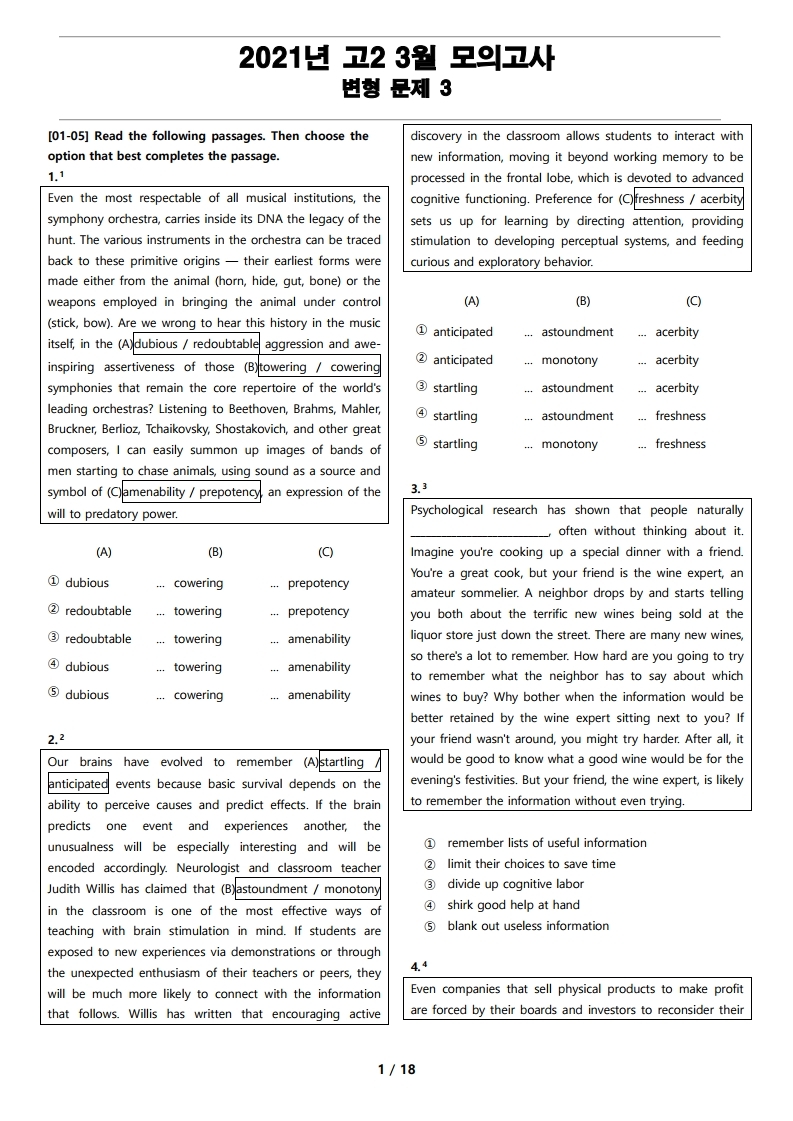2021년 고2 3월 전국 연합 모의고사
변형 문제 3

일반 워크북 형태의 문제에서 벗어나 The Makings가 만든
2021년 고2 3월 전국 연합 모의고사 변형 문제 3은
출판사에서 오랫동안 영어 번역과 교정을 하셨던 원어민 선생님과
현직에서 강사를 하고 있는 연구진들이 학생들을 위한 최상의
2021년 고2 3월 전국 연합 모의고사 변형 문제 3을 선보입니다.
사고력과 이해력을 요구하는 문제들로 내신 대비 뿐만이 아니라
수능도 한꺼번에 공부하실 수 있는 자료입니다.
중간고사&기말고사 전에 더메이킹스(The Makings)에서 제작한
2021년 고2 3월 전국 연합 모의고사 변형 문제로 마무리 하세요.
정답 확인하러가기!
2021년 고2 3월 전국 연합 모의고사 변형 문제
2021년 고2 3월 전국 연합 모의고사 변형 문제, 내신대비, 영어내신자료,고등영어자료, 모의고사 변형문제,전국 연합모의고사 변형자료, 모의고사 영어 서술형 대비, 대치동 고등 영어자료, 대치
themakings.co.kr
themakings.co.kr

The Makings의 2021년 고2 3월 전국 연합 모의고사 변형 문제는
총 11개의 유형으로 구성되어 있습니다.
1. 빈칸 채우기(객관식)
2. 글의 내용 일치/불일치(객관식/한글 선택지)
3. 글의 내용 일치/불일치(객관식/영어 선택지)
4. 글 끼어 넣기(객관식)
5. 어법(서술형)
6. 어휘(서술형)
7. 주제문(객관식/영어 선택지)
8. 어휘 빈칸 채우기(서술형)
9. 영작(서술형)
10. 요약문 완성하기(서술형)
11. 문단 재배열 하기(객관식)
더메이킹스(The Makings)가 제작한 2021년 고2 3월 전국 연합 모의고사
변형 문제 3의 지문입니다.
1번 지문(문항 번호 31번)
Even the most respectable of all musical institutions, the symphony orchestra, carries inside its DNA the legacy of the hunt. The various instruments in the orchestra can be traced back to these primitive origins — their earliest forms were made either from the animal (horn, hide, gut, bone) or the weapons employed in bringing the animal under control (stick, bow). Are we wrong to hear this history in the music itself, in the formidable aggression and awe-inspiring assertiveness of those monumental symphonies that remain the core repertoire of the world's leading orchestras? Listening to Beethoven, Brahms, Mahler, Bruckner, Berlioz, Tchaikovsky, Shostakovich, and other great composers, I can easily summon up images of bands of men starting to chase animals, using sound as a source and symbol of dominance, an expression of the will to predatory power.
2번 지문(문항 번호 32번)
Our brains have evolved to remember unexpected events because basic survival depends on the ability to perceive causes and predict effects. If the brain predicts one event and experiences another, the unusualness will be especially interesting and will be encoded accordingly. Neurologist and classroom teacher Judith Willis has claimed that surprise in the classroom is one of the most effective ways of teaching with brain stimulation in mind. If students are exposed to new experiences via demonstrations or through the unexpected enthusiasm of their teachers or peers, they will be much more likely to connect with the information that follows. Willis has written that encouraging active discovery in the classroom allows students to interact with new information, moving it beyond working memory to be processed in the frontal lobe, which is devoted to advanced cognitive functioning. Preference for novelty sets us up for learning by directing attention, providing stimulation to developing perceptual systems, and feeding curious and exploratory behavior.
3번 지문(문항 번호 33번)
Psychological research has shown that people naturally divide up cognitive labor, often without thinking about it. Imagine you're cooking up a special dinner with a friend. You're a great cook, but your friend is the wine expert, an amateur sommelier. A neighbor drops by and starts telling you both about the terrific new wines being sold at the liquor store just down the street. There are many new wines, so there's a lot to remember. How hard are you going to try to remember what the neighbor has to say about which wines to buy? Why bother when the information would be better retained by the wine expert sitting next to you? If your friend wasn't around, you might try harder. After all, it would be good to know what a good wine would be for the evening's festivities. But your friend, the wine expert, is likely to remember the information without even trying.
4번 지문(문항 번호 34번)
Even companies that sell physical products to make profit are forced by their boards and investors to reconsider their underlying motives and to collect as much data as possible from consumers. Supermarkets no longer make all their money selling their produce and manufactured goods. They give you loyalty cards with which they track your purchasing behaviors precisely. Then supermarkets sell this purchasing behavior to marketing analytics companies. The marketing analytics companies perform machine learning procedures, slicing the data in new ways, and resell behavioral data back to product manufacturers as marketing insights. When data and machine learning become currencies of value in a capitalist system, then every company's natural tendency is to maximize its ability to conduct surveillance on its own customers because the customers are themselves the new value-creation devices.
5번 지문(문항 번호 35번)
Academics, politicians, marketers and others have in the past debated whether or not it is ethically correct to market products and services directly to young consumers. This is also a dilemma for psychologists who have questioned whether they ought to help advertisers manipulate children into purchasing more products they have seen advertised. Advertisers have admitted to taking advantage of the fact that it is easy to make children feel that they are losers if they do not own the 'right' products. Clever advertising informs children that they will be viewed by their peers in an unfavorable way if they do not have the products that are advertised, thereby playing on their emotional vulnerabilities. The constant feelings of inadequateness created by advertising have been suggested to contribute to children becoming fixated with instant gratification and beliefs that material possessions are important.
'전국 연합 모의고사 변형 문제 > 고2 모의고사 변형 문제' 카테고리의 다른 글
| 2021년 고2 6월 전국 연합 모의고사 변형 문제 1 (0) | 2021.06.13 |
|---|---|
| 2021년 고2 3월 전국 연합 모의고사변형 문제 4 (0) | 2021.04.20 |
| 2021년 고2 3월 전국 연합 모의고사 변형 문제2 (0) | 2021.04.13 |
| 2021년 고2 3월 전국연합모의고사 변형문제 (0) | 2021.04.09 |
| 2020년 고2 11월 전국 연합 모의고사 영어 변형 문제 4 (0) | 2020.12.04 |